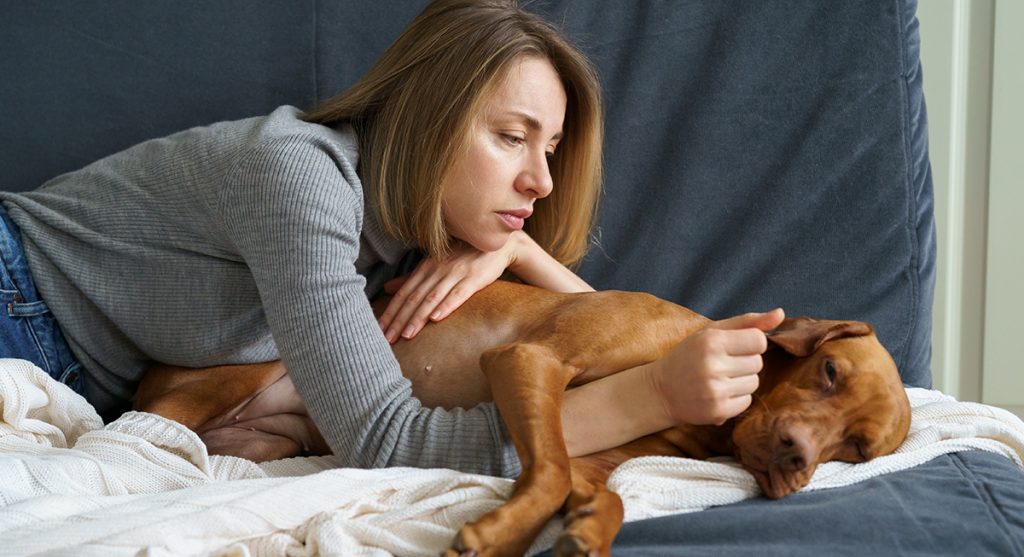Our furry companions bring so much joy into our lives, but sometimes, it can be hard to tell if they’re happy and content. Just like us, dogs can experience sadness, boredom, and anxiety. If you suspect your canine companion might be miserable, here are the signs to watch out for, along with tips on how to turn their frown upside down:
The Tail Tells All
A wagging tail is a classic sign of canine happiness, but a consistently tucked tail or low wag could indicate fear, anxiety, or unhappiness. Pay attention to your dog’s overall body language. Is their posture tense or relaxed? Are their ears perked up or flattened? These additional clues can help you understand their emotional state.
Loss of Interest in Playtime
Play is an essential part of a dog’s life. If your pup is consistently turning down playtime offers, it could be a sign they’re feeling down. Engage your dog in activities they used to enjoy. Try a new toy, introduce a puzzle feeder, or take them to a different park for a change of scenery.
Increasingly Destructive Behavior
Chewing furniture, digging in the yard, or excessive barking can all be signs of a bored or frustrated dog. Provide your dog with ample mental and physical stimulation. Increase their walks, engage in training sessions, and offer them chew toys that satisfy their natural chewing instincts.
Changes in Appetite
A sudden decrease or increase in appetite can be a red flag for health issues or emotional distress. Monitor your dog’s eating habits and consult your veterinarian if you notice any significant changes.
Sleep Patterns Go Awry
Excessive sleeping or difficulty settling down could be a sign of underlying anxiety or medical problems. Ensure your dog has a regular sleep schedule and a comfortable sleeping area. If sleep disturbances persist, consult your veterinarian.
Hiding Becomes Their New Hobby
Does your dog seem to be seeking solitude more often? Hiding under furniture or in secluded areas could indicate they’re feeling scared or overwhelmed. Create a safe space for your dog where they can feel comfortable and relaxed. Avoid forcing interaction and let them come to you when they’re ready.
Whining and Vocal Woes
Excessive whining, whimpering, or howling can be your dog’s way of communicating distress or boredom. Identify the potential cause of the vocalizations and address it accordingly. If it’s due to boredom, provide mental stimulation. If it’s due to separation anxiety, work on crate training or gradual departures.
Self-Inflicted Woes
Excessive licking, chewing, or scratching at themselves can be a sign of stress, allergies, or other underlying issues. Schedule a vet visit to rule out any medical causes. If it’s stress-related, provide your dog with calming activities and a predictable routine.
Potty Training Regress
Is your previously house-trained pup suddenly having accidents? This could be due to a medical condition, anxiety, or a change in their routine. Rule out medical issues with your veterinarian. If it’s behavioral, revisit potty training basics and ensure they have consistent access to appropriate elimination spots.
Unexplained Weight Loss
A dog losing weight without a change in diet could be a sign of illness, depression, or anxiety. Consult your veterinarian for a checkup. If it’s emotional, address the underlying cause and ensure they’re getting proper nutrition.
Less Enthusiastic Greetings
Does your furry friend seem less excited to see you when you return home? This could be a sign of separation anxiety or depression. Practice calm greetings and departures. Provide them with enrichment activities while you’re away, and consider desensitization training if separation anxiety is suspected.
Avoiding Eye Contact
Direct eye contact is a sign of trust and affection in dogs. Consistent avoidance could indicate fear, anxiety, or submission. Avoid forceful eye contact and let your dog initiate interaction when they’re comfortable. Create a positive and relaxed environment for them.
Growling or Snapping
While growling can be a normal form of communication, unusual growling or snapping could indicate fear or aggression. Identify the trigger for this behavior and avoid putting your dog in situations that cause them to feel threatened. If the behavior is persistent or worsening, consult a professional dog trainer or behaviorist to help address the underlying cause and ensure everyone’s safety.
Changes in Social Interactions
Does your once playful pup shy away from other dogs or people during walks? This could be a sign of fear, socialization issues, or underlying health problems. Consult a veterinarian to rule out medical causes. If it’s behavioral, consider positive reinforcement training techniques and gradual socialization in controlled environments.



